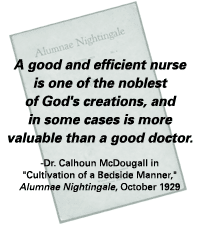Milestones

This October 1929 issue of the Alumnae Nightingale was donated to the School of Nursing by Julia Kyle of Atlanta. The volume belonged to her late mother-in-law, Mary Pugh Elliott Kyle, a 1912 graduate of Wesley Memorial.
A Nightingale
Takes Flight
Nurses launch 1929 alumni publication
This
is the first in a series of historical snapshots as the School of Nursing
prepares to celebrate its centennial in 2005.
Long before Emory Nursing magazine, there was the Alumnae Nightingale.
The publication first took flight in 1929, piloted by graduates of Wesley
Memorial Hospital’s Training School for Nurses. Originally located
in the Calico House in downtown Atlanta, the hospital and school moved
to the Emory campus after Emory University Hospital was completed in 1922.
The school then became the Emory Hospital School of Nursing.
In the October 1929 Alumnae Nightingale, editor Minnie B. Bass,
(a 1923 Wesley Memorial graduate) and her staff published “To the
Nightingale,” an ode to the publication by Lucille Jones (a 1931
Wesley Memorial graduate), and an article on “Cultivation of a Bedside
Manner,” in which author and Emory physician Calhoun McDougall stated
that “a good and efficient nurse is one of the noblest of God’s
creations, and in some cases is more valuable than a good doctor.”
The issue also offered differing views of Army nursing in wartime and
peacetime. In 1917, Ella M. Brown Britton reported for nursing duty during
World War I, three years after graduating from Wesley Memorial. “My
first night in the Army will ever be a nightmare to me,” she wrote
of her stint in the base hospital at Camp Wheeler, Georgia. “Things
were not very well organized then, as the hospital had just opened a short
time. Some few of the patients were convalescent, but most of them had
pneumonia following measles and flu, while there were a number of cases
of mumps and a few of meningitis. A severe electrical storm had cut off
the lights, and I had to prepare a spinal puncture tray by the light of
a lantern, sterilize my syringes, needles, etc., on a little old-fashioned
oil stove—and to cap the climax, I broke the 500 cc. syringe. While
I was at midnight supper, one of my pneumonia patients with temperature
of 105 degrees, in his delirium, walked across the square to the ward
from which he had just been transferred. Three pneumonia patients died
during the night. Then to make my first night complete, I got the thermometers
mixed on the wards for which I received a genuine Army bawling out.”
Britton eventually was assigned to the eye, ear, nose, and throat ward
and then was shipped to France in the summer of 1918. She first was stationed
near Argonne, site of one of the war’s worst battles, and then at
a clinic where she worked with Dr. McDougall, a member of the Emory Medical
Unit. As Britton wrote, “It seems to me that ‘we’ took
out the tonsils of the entire United States Army. After the clinic was
closed, I spent the rest of my service in the operating room, but the
work there was mostly surgical dressings; I did 125 one morning.”
For Pat Fulwood, a 1924 Wesley Memorial graduate stationed at Fort McPherson
in Atlanta, Army nursing during peacetime was just as tumultuous. In the
course of one week, she tended two reckless prisoners injured by exploding
shrapnel (one lost an arm), a fussy captain with a tonsilar abscess, a
new mother and baby, a mental patient who attacked the ward master with
a razor, and two malaria patients. She also had to contend with a young
private who informed her he would not take orders from a nurse and a smiling
commanding officer who observed that “things seem to be pretty quiet.”
Despite the chaos, Fulwood found her work agreeable most of the time.
Her colleagues were congenial, the soldiers easier to nurse than most
civilians, and the doctors, with one or two exceptions, were considerate
and pleasant. She concluded, “On the whole, to quote the prisoner
who lost his arm, ‘The Army ain’t so bad.’ ”